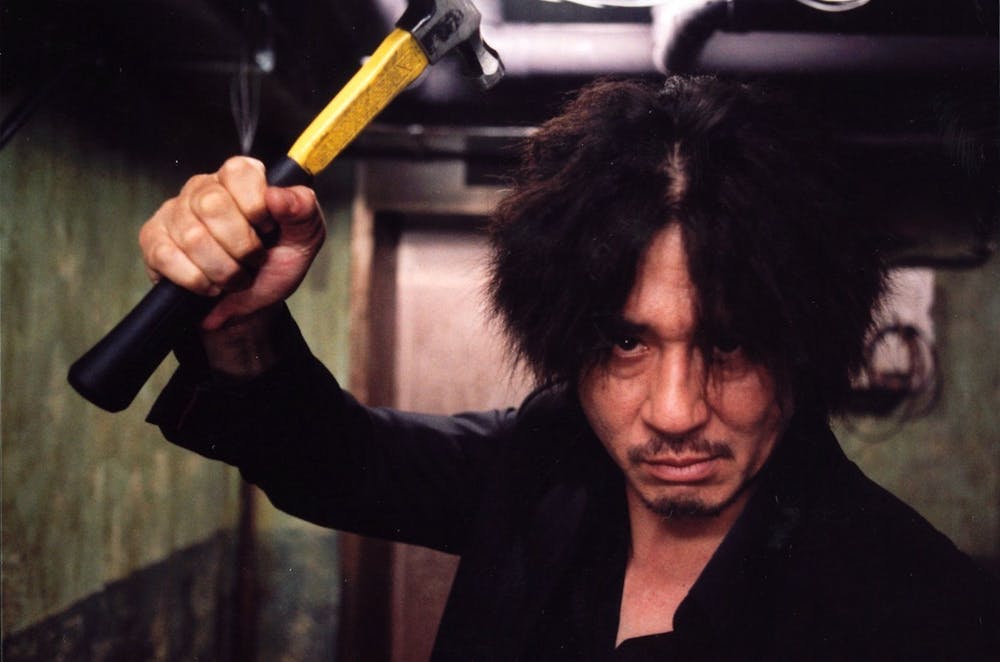“Impeccable action sequences,” “a truly mind-blowing ending,” “a masterpiece in Korean cinema” — all these accolades have been attributed to Park Chan-wook’s 2003 film “Oldboy.”
Despite being consistently ranked as one of the greatest thrillers, the movie remains largely unfamiliar to the American public. In the self-proclaimed “film bro” community, “Oldboy” is a mythical legend. Social media creators have raved endlessly about the film, while we are left grasping at straws trying to find a movie that has seemingly been removed from the internet altogether. I consider myself quite crafty in the sphere of pirating movies, and have searched for “Oldboy” for nearly three years, even trying a South Korean VPN to trick my Netflix into thinking I reside in Seoul, South Korea and not Durham, NC. This, of course, was to no avail.
On Aug. 16, this changed when the movie was re-released in select theaters for its 20th anniversary. I had the chance to see the film in theaters; however, if a trip to the movies is too inconvenient, the good news is that “Oldboy” has also been released for rent or purchase on Apple TV. So now that we know we can watch the movie, the natural next question is: “Does it live up to the hype?”
In the 2000s, “Oldboy” may have been best known as the movie where the protagonist eats a live octopus on screen, or maybe the one where a man fights a hallway full of people armed only with a hammer (more on this later). It is violent, gory, action-packed and extremely visceral. But this film is so much more than the sheer shock value it provides.
The film begins with Oh Dae-su, a seemingly ordinary man who has been inexplicably imprisoned in a small cell for 15 years. During his captivity, Dae-su is driven to paranoia, with no contact with the outside world or knowledge of who his captors are or why he's being held prisoner. One day, just as mysteriously as his imprisonment, Dae-su is released. With a new determination to find his captors and discover the reasons behind his imprisonment, he embarks on a relentless quest for revenge. As Dae-su investigates his past and searches for answers, he becomes entangled in a complex web of conspiracy, violence and dark secrets, and begins to uncover disturbing truths about his captors and the reasons behind his long incarceration.
“Oldboy” shares elements of classic cat-and-mouse chase films such as “Se7en” or “No Country for Old Men'' while also paralleling the likes of "Memento" and "Mulholland Drive” for the ambiguity and mystery the plot holds. For most of the movie, we have no clue what is going on, who anyone is or what their motives are. But watching “Oldboy” is like sitting in the first row at the World Cup final or seeing Taylor Swift perform live, where it doesn’t matter whether we know the rules of soccer or if we can relate to stories of toxic exes. The atmosphere established and the emotions evoked are simply so powerful that we don’t have to understand what’s going on to enjoy and appreciate the work at hand. “Oldboy” is the same way.
The film is heart-pounding yet cerebral, brutal yet stylish, traditional in theme and yet extraordinary in delivery. For starters, the cinematography is stunning and visually striking. The film is filled with meticulously crafted shots, artistic framing, a vibrant color palette and iconic action sequences. One scene in particular stands out; if you have seen “Oldboy”, I am sure we are on the same page. The infamous hallway fight scene — as Dae-su battles dozens of thugs down a corridor while wielding only a claw-tooth hammer — is utterly mesmerizing and even more impressive when considering it was all filmed in one long continuous shot, with no hidden edits or CGI.
The film's characters are also multi-dimensional and morally ambiguous. The bizarre and compelling protagonist, Oh Dae-su, sporting a tangle of wiry hair and a permanent thousand-yard stare, undergoes a transformation as he seeks revenge and uncovers the truth behind his imprisonment. The antagonist, Lee Woo-jin, is equally complex, making the audience question their sympathies and allegiances. Lastly, the soundtrack, composed by Jo Yeong-wook is atmospheric and evocative, striking and melancholic, and plays a significant role in shaping the tone and emotional impact of the film.
Of course, the acclaim received by “Oldboy” is largely attributed to its dramatic conclusion. Towards the latter half of the film, we begin to piece together an understanding of Lee Woo-jin’s origins, as well as the reason for Oh Dae-su’s imprisonment. Then we reach the climax of the film, and we are provided with a decisively sadistic plot twist that leaves the audience entirely shocked as well as completely enlightened. In the same tier as “The Sixth Sense,” “Fight Club" and “Star Wars: The Empire Strikes Back,” the ending alone is enough of a reason to watch. But there truly is much more to the masterpiece that is Park Chan-wook’s “Oldboy.”
Get The Chronicle straight to your inbox
Sign up for our weekly newsletter. Cancel at any time.

